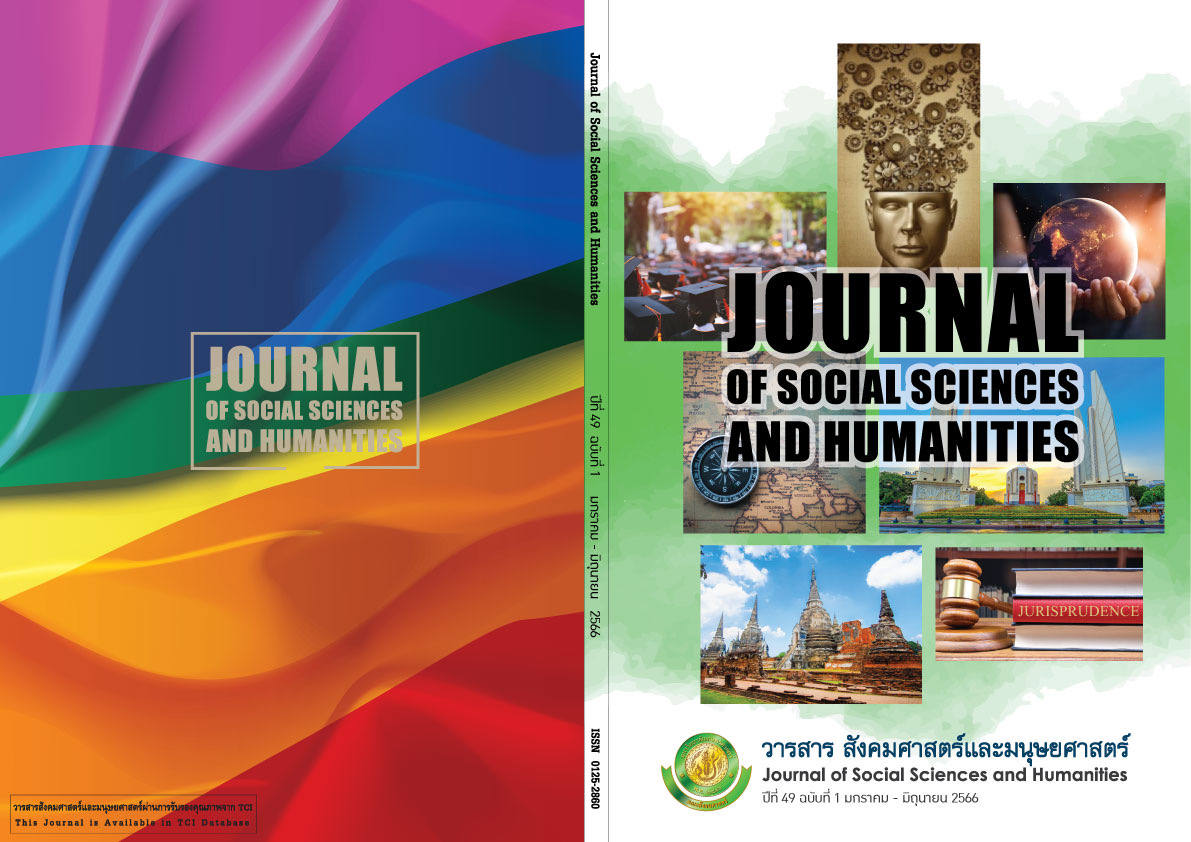Communication Strategy of "Knowledge of Thai Traditional Medicine" to Counter Fake News on Social Networks of Thai Traditional Medical Agencies in Thailand
Main Article Content
บทคัดย่อ
This research aimed to study about: 1) communication process; 2) communication strategy; 3) communication problems and obstacles; and 4) guidelines to communicate knowledge of Thai traditional medicine to counter fake news on social networks by means of mixed method research. For quantitative one, samples from the central region of the country (from 22 provinces) were collected with the total number of 2,508 people. For qualitative method, in-depth interview from Thai traditional medical agencies.
The findings revealed that : 1) communication process of knowledge of Thai traditional medicine to counter fake news on social networks was having Thai traditional medical personnel as key messengers focusing on communicating facts and using suitable media with the target group of different age range, which was congruent with opinion survey results related to factors affecting “Knowledge of Thai Traditional Medicine” communication of Thai people, who had always received the information on this matter from the network of hospitals at a high level with the mean score of 4.11 2) communication strategy involved propagating facts within twenty-four hours after fake news had been detected ; 3) significant problems and obstacles were those of quantity and speed of fake news on social media which was found to be in abundance; and 4) one communication guideline that AI should be used to detect fake news and propagate facts, law should be strictly enforced and so forth.
Article Details

อนุญาตภายใต้เงื่อนไข Creative Commons Attribution-NonCommercial-NoDerivatives 4.0 International License.
เอกสารอ้างอิง
Bangkok business online. (2023). Check here. 1 year has passed. What 'fake news' do Thai people find the most?.
https://www.bangkokbiznews.com/social/941587.
Benjawan Kunviroteluck, Supakit Issadisai, Arnon Tubtiang. (2020). Factors Reducing the Spread of Fake News on social media. Humanities and Social Sciences Journal Ratchaphruek University, 6(2), 196-213.
Cronbach, L. J. (1990). Essentials of psychological testing. (5th ed.). Harper Collins Publishers.
Cherd Bundasak. (2019). Fake News' from a Philosopher's Perspective The reason for existence and coping. https://today.line.me/th/v2/article/gXQOLg. 1.
Chalermchai Kokkeadtikul, Thanyanontanat Danpaiboon, (2018). FAKE NEWS: PROBLEMS
AND CHALLENGES. The NBTC Academic Journal, 2(2), 174-192.
European Commission. (2018). The Legal Framework to Address “Fake News”: Possible Policy Actions at the EU Level. http://www.europarl.europa.eu/RegData/etudes/IDAN/2018/
/IPOLIDA(2018)619013_EN.pdf.
Gross, G. (2018). Fake News Spreads Fast, But Don’t Blame the Bots. https://www.internetsociety.org/blog/2018/03/fakenews-spread-fast-dont- blame-bots/.
Gelfert, A. (2018). Fake News: A Definition. Informal Logic, 38(1), 84-117. https://doi.org/10.22329/il.v38i1.5068).
Isariya Paireepairit. (2017). Fake News: Fake News, The big problem of the internet world. http://www. okmd.tv/blogs/all-things-digital/fake-news.
Jutatip Chanlun. (2020). Information Behavior during COVID-19 Pandemic Era. TLA Bulletin, 64(2), 36-49.
Jongrak Tesana. (2020). Infographics. https://shorturl.asia/bixuF. 54-56.
Klapper, JT. (1960). The effects of mass communication. Free Press.
Krejcie, R. V., & Morgan, D. W. (1970). Determining sample size for research activities. Educational and psychological measurement, 30(3), 607-610.
Kheawpan Leelasorn (2018). Alternative Credit Scoring and Information Security. https://shorturl.asia/rB1h8. 1.
Likert, R. (1967). The Method of Constructing and Attitude Scale. In Reading in Fishbeic,
M (Ed.), Attitude Theory and Measurement. Wiley & Son.
Lazer, D. M. J., Buam, M. A., Benkler, Y., Berinsky, A. J., Greenhill, K. M., Menczer, F., Zittrian, J. L. (2018). The Science of Fake News. Science Magazine, 359(6380), 1094-1096.
Ministry of Digital Economy and Society. (2021). DES reveals numbers of fake news prosecution in 2020-2021. https://zhort.link/HA1.5.
Nuntika Noosom. (2018). The Analysis of Fake News and The Level of Media Literacy of Users in Bangkok. Mass Communication Arts (Strategic Communications). Bangkok University.
Namthip Wipawin. (2015). Network in a Networked Society. Research Journal Library Association of Thailand. 8(2), 119-127.
Paporn Phuttitanakarn Akawit Theintawon. (2020). Development guidelines of media literacy for fake news for undergraduate students in Bangkok. Journal of Rattana Bundit University. 15(2), 173-182.
Paireepairit Isariya. (2017). Fake News, fake news, big problem of internet world. http://www. okmd.tv/blogs/all-things-digital/fake-news.
Pin Pattana. (2017). Knowing that he is deceived but willing to deceive. Knows 'Fake News'. Fake news online that we come across more and more often every day. https://adaymagazine.com/global-7/.
Phanwadee Chaikij, Sumonthip Chitsawang. (2021). The Fake News's Infoemic about the COVID-19 Pandemic and the Preventive Measures in Thailand. Rajapark Journal, 15(40), 14-32.
P´erez-Rosas, V., Bennett Kleinberg, B., Lefevre, A. & Mihaela, R. (2017). Automatic Detection of Fake News. https://aclanthology.org/C18-1287/. 35-39.
Sarawut Jubsri. (2021). Ministry of Public Health’s Communication in the Situation of Coronavirus Disease (COVID-19) Pandemic. Journal of Communication, 11(1), 13-29.
Thaipost online. (2017). WHO supports trial of medicinal herbs to treat coronavirus. https://shorturl.asia/6qyBl.
Thairat Online. (2021). Thai herbs fight covid Survivor at home. https://www.thairath.co.th/news/society/2152508.
World Health Organization (WHO). (1996). Health Promotion Glossary. Geneva: World Health Organization.
Wardle, C. (2017). Fake news: It’s complicated. Retrieved from https://firstdraftnews.org/fake-news-complicated/.
World Health Organization (WHO). (2020). Pandemic fatigue–reinvigorating the public to prevent COVID-19. https://apps.who.int/iris/handle/10665/335820.
Wasana Chansawang. (2007). Health Communication: Strategies for Health Education and Health Promotion. CDMK.
Xinyi, Z., Reza, Z., Kai, S. & Huan, L. (2019). Fake News: Fundamental Theories, Detection Strategies and Challenges. WSDM ’19, Melbourne, VIC.


